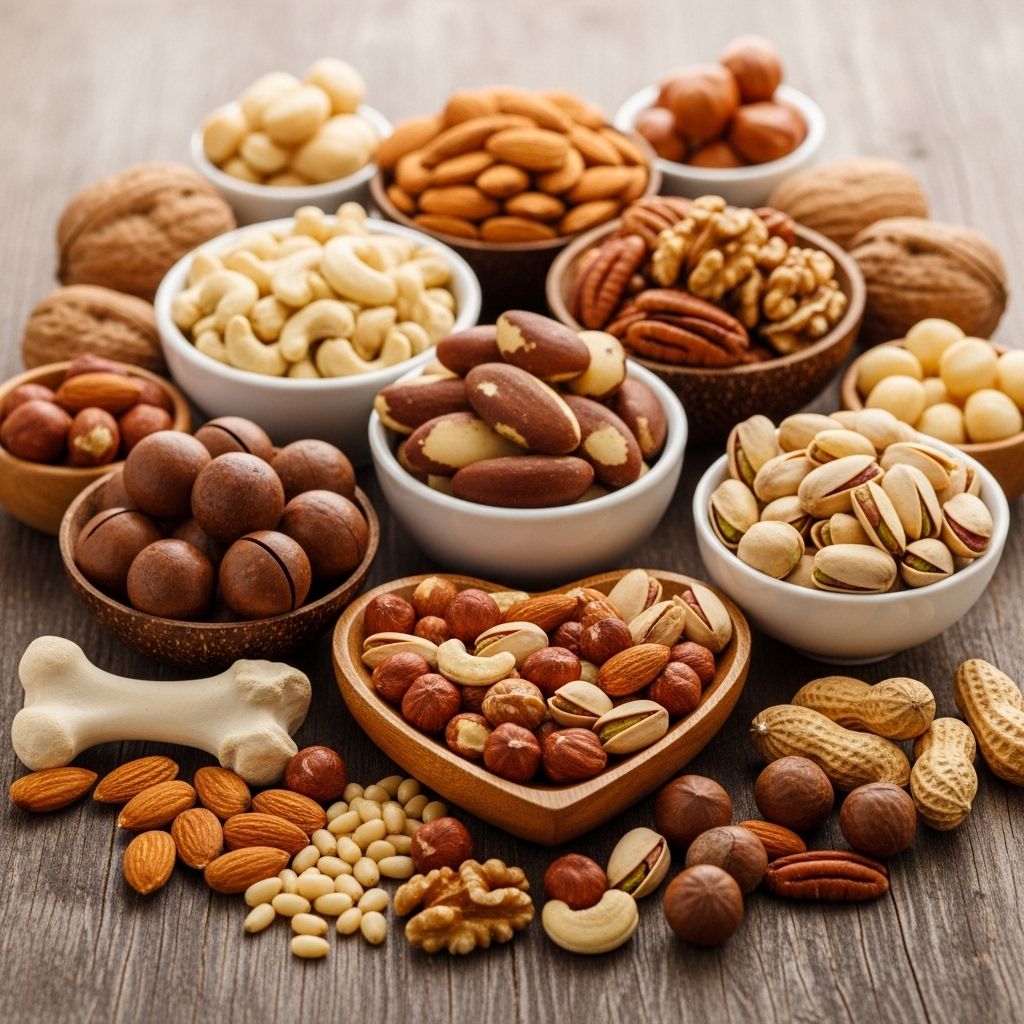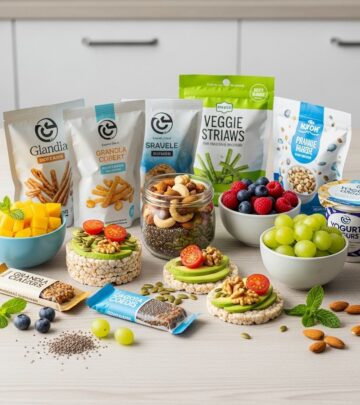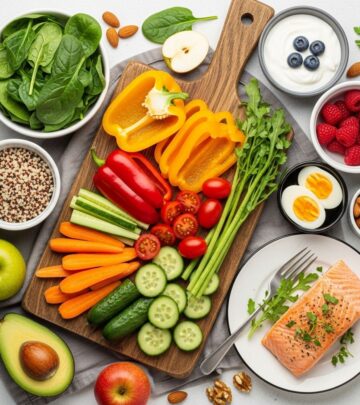Nuts High in Magnesium: Top Choices for Heart and Bone Health
Snack on bite-sized powerhouses that boost energy and ease muscle tension.

Magnesium is an essential mineral required for hundreds of biochemical reactions in the human body, crucial for energy production, nerve function, muscle contraction, and maintaining healthy bones and a robust heart. While a variety of foods provide magnesium, nuts offer a particularly dense natural source along with other health-promoting nutrients. This guide details the best nuts high in magnesium, how they benefit your health, and expert-approved ways to incorporate them into your diet.
Why Magnesium Matters for Your Health
Magnesium supports:
- Muscle and nerve function: Enables contraction and relaxation, and helps with electrical impulse transmission.
- Bone health: Helps in building bone structure and increases calcium absorption.
- Heart health: Regulates heartbeat and blood pressure and supports vascular health.
- Energy creation: Participates in converting food into usable energy.
- Blood sugar control: Aids in insulin regulation and glucose metabolism.
Low magnesium intake has been associated with increased risks of heart disease, osteoporosis, type 2 diabetes, and migraines. It’s estimated that a significant portion of adults in the U.S. fall short of the recommended daily allowance (RDA) for magnesium.
Recommended Daily Magnesium Intake
| Age & Sex | Recommended Daily Intake |
|---|---|
| Adult Men (19-30) | 400 mg |
| Adult Men (31+) | 420 mg |
| Adult Women (19-30) | 310 mg |
| Adult Women (31+) | 320 mg |
| Pregnant Women | 350-360 mg |
| Lactating Women | 310-320 mg |
Top Nuts High in Magnesium
Nuts not only provide healthy fats and plant-based protein, but certain varieties are especially high in magnesium. Incorporating a variety of these into your eating pattern can help you meet your magnesium and other micronutrient needs.
1. Brazil Nuts
- Magnesium content: About 350 mg per 100 grams (28 grams ≈ 1 oz provides approximately 100 mg magnesium)
- Percent of RDA per serving: ~26% for men, ~34% for women
- Other highlights: One of the richest natural sources of selenium; delivers healthy unsaturated fats, copper, and phosphorus.
Brazil nuts are nutrient-dense and may help support thyroid function and antioxidant activity. With their high selenium content, moderation is key—just a couple of nuts meet the daily selenium requirement.
2. Chia Seeds*
- Magnesium content: 335 mg per 100 grams (15 grams = about 2 tbsp = ~50 mg magnesium per serving)
- Percent of RDA per serving: 13% for men, 16% for women
- Other highlights: High in omega-3s, fiber, and calcium.
*Note: While technically a seed, chia is often consumed like a nut or mixed into nut blends for a magnesium-rich diet.
3. Cashews
- Magnesium content: 292 mg per 100 grams (28 grams ≈ 1 oz provides about 83 mg magnesium)
- Percent of RDA per serving: 20% for men, 26% for women
- Other highlights: Packed with iron, zinc, and beneficial polyunsaturated fats.
Cashews have a buttery flavor and creamy texture, making them a favorite in snacking and plant-based recipes. They also boost blood sugar regulation and support heart health.
4. Pili Nuts
- Magnesium content: 270 mg per 100 grams (28 grams provides ~75 mg)
- Percent of RDA per serving: 19% for men, 24% for women
- Other highlights: High in vitamin E, thiamin (B1), and healthy fats.
Pili nuts are less commonly found but are prized for their ultra-smooth texture and micronutrient richness.
5. Almonds
- Magnesium content: 268 mg per 100 grams (28 grams provides ~76 mg; 43 grams provides ~115 mg)
- Percent of RDA per serving (43g): 29% for men, 37% for women
- Other highlights: Excellent source of vitamin E, manganese, and healthy monounsaturated fats.
Almonds help lower cholesterol, support weight management, and are linked to a reduced risk of heart disease.
6. Pumpkin Seeds**
- Magnesium content: 550 mg per 100 grams (28 grams ≈ 175 mg magnesium)
- Percent of RDA per serving: 38% for men, 49% for women
- Other highlights: Abundant in zinc, iron, and protein.
**Technically a seed but commonly included in nut and seed blends for their superior magnesium content.
Pumpkin seeds (pepitas) are an extremely concentrated source of magnesium, making them an easy way to boost intake with little volume.
7. Walnuts
- Magnesium content: 158 mg per 100 grams (45 grams ≈ 71 mg; 28 grams ≈ 44 mg)
- Percent of RDA per serving: About 18% for men, 23% for women (45 gram serving)
- Other highlights: Contains omega-3 fatty acids (ALA); promotes brain health.
Walnuts provide a unique mix of plant omega-3s and antioxidants beneficial for cardiovascular and cognitive health.
8. Hazelnuts
- Magnesium content: 163 mg per 100 grams (28 grams provides ~46 mg)
- Percent of RDA per serving: 11% for men, 15% for women
- Other highlights: High in vitamin E, copper, and manganese.
Hazelnuts help in managing inflammation and supporting healthy skin and blood vessels.
9. Sunflower Seeds*
- Magnesium content: 129 mg per 100 grams (28 grams ≈ 37 mg)
- Percent of RDA per serving: 9% for men, 12% for women
- Other highlights: Packed with vitamin E, healthy fats, and phytosterols.
Sunflower seeds add crunch to salads and snacks while helping maintain cardiovascular health.
10. Pistachios
- Magnesium content: 121 mg per 100 grams (28 grams ≈ 34 mg)
- Percent of RDA per serving: 6% for men, 8% for women
- Other highlights: Rich in fiber, antioxidants, and vitamin B6.
Pistachios are also great for gut health and lower calorie content compared to many nuts.
Comparing Magnesium Content in Common Nuts and Seeds
| Nut/Seed | Mg per 100g | Approx. Mg per 28g | % RDA (Men) | % RDA (Women) |
|---|---|---|---|---|
| Pumpkin Seeds | 550 mg | 175 mg | 38% | 49% |
| Brazil Nuts | 350 mg | 100 mg | 26% | 34% |
| Chia Seeds | 335 mg | 50 mg | 13% | 16% |
| Cashews | 292 mg | 83 mg | 20% | 26% |
| Pili Nuts | 270 mg | 75 mg | 19% | 24% |
| Almonds | 268 mg | 76 mg | 19% | 24% |
| Walnuts | 158 mg | 44 mg | 11% | 14% |
| Hazelnuts | 163 mg | 46 mg | 12% | 14% |
| Sunflower Seeds | 129 mg | 37 mg | 9% | 12% |
| Pistachios | 121 mg | 34 mg | 8% | 10% |
*Percentages are approximate and based on a 400 mg RDA for men and 320 mg for women.
Health Benefits of Eating Magnesium-Rich Nuts
- Heart health: Magnesium helps regulate heartbeat, relaxes blood vessels, and lowers blood pressure. Nuts like almonds and cashews are associated with reduced cardiovascular risk.
- Bone strength: Nuts provide not only magnesium, but also phosphorus and calcium for stronger bones.
- Blood sugar regulation: Regular nut consumption supports healthy blood sugar and may lower diabetes risk.
- Muscle relaxation: Adequate magnesium intake can prevent cramps and spasms.
- Better sleep: Magnesium in nuts is linked to improved sleep quality and relaxation.
- Antioxidant support: Many nuts provide vitamin E, selenium, and protective phytochemicals that counter oxidative stress.
How to Add Magnesium-Rich Nuts to Your Diet
- Keep portable snack bags: Mix various nuts in small containers for on-the-go snacks.
- Top salads, oatmeal, and yogurt: Add nuts and seeds for crunch and efficacy.
- Blend into smoothies: Almonds, cashews, chia, or pumpkin seeds create creamy, nutrient-rich drinks.
- Use as a crust or coating: Ground nuts work great for baked fish or chicken.
- Stir into baked goods: Replace some flour with ground nuts or seeds in bread and muffins for added nutrition.
Tip: Choose unsalted, raw varieties where possible, and mind portion sizes—nuts are calorie-dense, and moderation is key for balanced nutrition.
Other Sources of Magnesium
While nuts are excellent, don’t forget other magnesium-rich foods:
- Dark leafy greens: Spinach, Swiss chard, kale
- Whole grains: Quinoa, brown rice, oats
- Legumes: Black beans, chickpeas, lentils
- Dark chocolate: At least 70% cocoa
- Avocado and bananas: Fruit options with notable magnesium levels
Possible Side Effects and Precautions
- Overconsumption: Extremely high magnesium from food is rare, but supplements can cause gastrointestinal issues or toxicity in susceptible individuals.
- Allergies: Nut allergies are common; seeds may be suitable alternatives.
- Caloric density: Nuts are high in calories, so those watching weight should be mindful of servings.
- Kidney function: Individuals with kidney disease should consult their doctor before increasing magnesium intake significantly.
Frequently Asked Questions (FAQs)
Q: Which nut has the highest amount of magnesium?
A: Pumpkin seeds lead, followed closely by Brazil nuts, chia seeds, cashews, and almonds. Among traditional nuts, Brazil nuts are tops for magnesium.
Q: How much magnesium do you get from a normal handful of mixed nuts?
A: A standard 1-ounce (28-gram) handful of mixed nuts typically supplies between 50–100 mg of magnesium, depending on the mix and including seeds can boost this further.
Q: Can eating more nuts really cover my daily magnesium needs?
A: Incorporating a variety of magnesium-rich nuts as part of a balanced diet can help meet or exceed daily magnesium requirements for most adults.
Q: Who should be cautious with high-magnesium foods?
A: Individuals with kidney issues, allergy concerns, or those taking certain medications should consult a health professional before significantly increasing magnesium intake.
Q: Are raw nuts better than roasted for magnesium?
A: Both raw and oven-roasted nuts retain most of their magnesium, but added salt or oil in packaged varieties may reduce overall healthfulness.
Takeaway: Include Magnesium-Rich Nuts for Better Health
Regularly consuming magnesium-rich nuts is an easy, tasty way to support heart, bone, nerve, and muscle health. Consider adding a handful of almonds, cashews, Brazil nuts, or a sprinkle of pumpkin and chia seeds to your meals and snacks. Their benefits extend far beyond magnesium, delivering a powerhouse of nutrients for overall vitality and long-term wellness.
References
- https://naturesgarden.net/blogs/tips/health-tips-top-magnesium-rich-nuts
- https://www.healthline.com/nutrition/10-foods-high-in-magnesium
- https://pmc.ncbi.nlm.nih.gov/articles/PMC9601893/
- https://health.clevelandclinic.org/foods-that-are-high-in-magnesium
- https://www.nal.usda.gov/sites/default/files/page-files/magnesium.pdf
- https://www.healthdirect.gov.au/foods-high-in-magnesium
- https://www.goodhousekeeping.com/health/diet-nutrition/g65668426/nuts-high-in-magnesium/
- https://www.dartmouth-hitchcock.org/stories/article/foods-magnesium-your-body-needs
Read full bio of Sneha Tete












